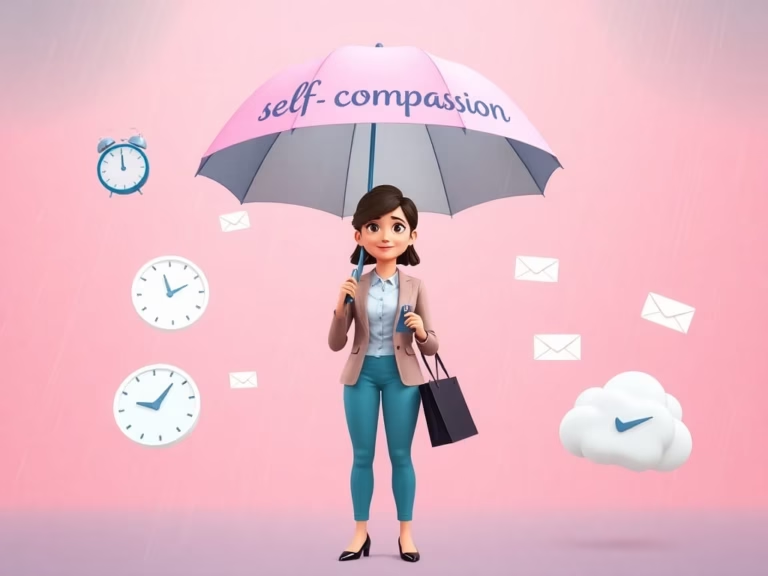The Best Practices for Mindful Self-Compassion: A Guide to Well-Being

Table of Contents
Let me ask you something straight up: Are you tired of being your own worst critic? Do you crush your goals at work — yet feel like a fraud inside? If you’re a high-achieving professional, manager, or senior leader, chances are you’re no stranger to this internal war.
You perform. You lead. You succeed. But deep down, there’s a whisper that says: “You should be doing better. You’re not enough.” And that whisper? It’s what leads to burnout, exhaustion, and emotional disconnection — the silent cost of success.
But what if there’s another way? A way to be powerful and peaceful. Driven and deeply content. Focused and free from the inner critic’s chokehold. That path is called Mindful Self-Compassion. With its proven power, it could change everything.

What is Mindful Self-Compassion?
Mindful Self-Compassion is the secret sauce to sustainable success and inner freedom. It’s not about going soft. It’s not about giving up. And it’s definitely not about letting yourself off the hook. It’s about shifting the inner narrative — from self-punishment to self-partnership.
Here’s what it means:
Mindfulness:
You get present. You face what is, without running or judging difficult emotions.
Self-Compassion:
You stop beating yourself up. You start speaking to yourself with the same love and understanding you’d give your best friend. The core principles of Mindful Self-Compassion include self-kindness, feeling a sense of common humanity, and maintaining balanced, mindful awareness.
This is about emotional mastery — and it’s the edge most high performers are missing.
Definition of Mindfulness and Self-Compassion
Mindfulness is all about being fully present in the moment. It means paying attention to your thoughts, feelings, and sensations without getting caught up in them or judging them. Imagine observing your mind like a curious scientist, noting what you find without labelling it as good or bad. This practice helps you develop a deeper understanding of yourself and your experiences.
Self-compassion, on the other hand, is about treating yourself with the same kindness and understanding you would offer to a dear friend or other human being. When you face struggles or make mistakes, instead of beating yourself up, you approach yourself with warmth and acceptance. It’s recognising that being human means experiencing suffering and imperfection, and that’s okay.
When you practice self-compassion and mindfulness, you create a powerful duo that enhances your self-awareness, self-acceptance, self appreciation and resilience. By practicing mindfulness and learning self-compassion, you can navigate difficult emotions, challenging relationships and experiences with greater ease and kindness.
This combination allows you to face life’s challenges with a gentle strength, transforming how you relate to yourself and the world around you.

The Benefits of Mindful Self-Compassion for High Achievers
Let’s get one thing straight: Self-compassion is a performance enhancer.
When you drop the constant inner warfare, you gain:
Emotional freedom — say goodbye to the rollercoaster
Mental clarity — no more spiralling over one comment or missed deadline
Resilience under pressure — bounce back faster than ever
True confidence — not the kind that crumbles at criticism
Sustained success — because burnout doesn’t have to be your baseline
Science backs it. Coaches swear by it. And when practiced consistently? It becomes your inner power source.
Additionally, self-compassion positively impacts mental health by helping you engage in perspective-taking and reducing rumination. It serves as an antidote to self-pity during difficult moments, ultimately leading to improved mental well-being.

Proven Research on Mindfulness and Self-Compassion
The benefits of mindfulness and self-compassion are not just feel-good concepts; they are backed by solid research. Studies have shown that practicing mindfulness and self-compassion is strongly linked to improved emotional wellbeing, greater life satisfaction, and better physical health.
People who embrace these practices tend to experience lower levels of anxiety and depression and are more resilient when facing adversity. Rapidly expanding research demonstrates that self-compassion is a key factor in emotional wellbeing. It helps reduce anxiety, depression, and stress, regulate emotions, and supports the maintenance of healthy habits like a balanced diet and regular exercise.
Moreover, self-compassion fosters satisfying personal relationships by promoting empathy and understanding – both of ourselves and others. Recognising the powerful impact of these findings, Rainmaker Life Coaching integrates the same evidence-based principles of mindfulness and self-compassion championed by experts like Dr. Kristin Neff into a coaching journey designed specifically for high-achieving professionals.
Rather than offering a one-size-fits-all course, our coaching approach is highly personalised — helping clients break free from perfectionism, silence the inner critic, and cultivate a compassionate, empowering inner voice for emotional wellbeing.
Through tailored sessions, guided reflections, and actionable tools, clients learn to:
Be fully present with their thoughts and emotions without judgment (mindfulness)
Respond to personal setbacks with kindness instead of criticism (self-compassion)
Build the inner strength and balance needed to lead with clarity, calm, and confidence – even in high pressure environment.
This isn’t a one-size-fits-all course. It’s a guided transformation journey, tailored to your life, your challenges, and your goals. And it begins with the choice to treat yourself with the compassion you deserve.
The result?
Clients experience greater life satisfaction and emotional wellbeing — not just in their work, but in how they show up for themselves every day.

Practicing Mindful Self-Compassion
You don’t need to meditate in a cave for 30 days. You don’t need to recite 108 affirmations every morning (though you could). You just need to bring awareness, kindness, and presence into your day. You can learn practices to evoke self-compassion in your daily life.
Here’s how:
Mindfulness and Self-Compassion Exercises
1. The 60-Second Self-Compassion Reset
In any stressful moment, ask yourself:
What am I feeling right now?
What do I need right now?
Can I give myself permission to feel this, without judgment?
Then breathe. Feel your feet. Soften your shoulders. Say: “It’s okay. I’ve got me.”
This exercise allows individuals to directly experience self compassion.

2. Flip the Script
Notice your negative self-talk — “I messed that up again,” “I’m a failure.” Now flip it with self compassion: “I’m learning. I did my best. I’m growing stronger through this.” Repeat it like a mantra. Let it rewire your nervous system. Practice self compassion in your daily lives.
3. High-Achiever Affirmation
When you feel inadequate or experience chronic pain, say this out loud, every day: “I am enough. I am human being. I am still worthy, even when I’m not perfect.” Relate wholeheartedly. This is emotional self-leadership. This is what it feels like to rise.
Self-compassion means treating yourself with kindness and understanding, especially during challenging times.

Cultivating Self-Compassion in Daily Life
Incorporating self-compassion into your daily life doesn’t require drastic changes. Here are some simple yet powerful practices to help you get started:
Practice Mindfulness Meditation:
Dedicate a few moments each day to sit quietly, focus on your breathing, and develop a non-judgmental awareness of the present moment. This practice helps you stay grounded and connected to yourself.
Practice Self-Kindness:
Treat yourself with the kindness and compassion you would offer to a good friend. When you make a mistake or face a challenge, be gentle with yourself and avoid harsh self-criticism.
Practice Common Humanity:
Remember that everyone experiences suffering and imperfection. You are not alone in your struggles. Recognizing this shared human experience can help you feel more connected and less isolated.
Practice Mindful Self-Compassion:
Combine mindfulness and self-compassion by paying attention to your thoughts, feelings, and sensations with kindness and understanding – connected presence. This practice helps you approach difficult emotions with greater ease and compassion.
By integrating these practices into your daily routine, you can cultivate a greater sense of self-compassion and emotional resilience, allowing you to navigate life’s challenges with more grace and kindness.

Practicing Imperfection and Common Humanity
Let’s be real: Perfectionism is just fear in a fancy outfit. You don’t have to feel inadequate. When you drop the act and own your imperfection, you unlock connection, authenticity, and joy. Because guess what?
You’re not alone. Every leader you admire has doubted themselves. Every expert you follow has fallen short. It’s not about avoiding failure — it’s about how you speak to yourself when it happens. You are not the only one struggling. That awareness? It’s liberating. It’s healing. It’s human.
Practicing imperfection and common humanity fosters a connected presence with oneself and others.

Overcoming Barriers to Self-Compassion
Let’s get honest.
Here’s what usually gets in the way:
“If I’m too soft on myself, I’ll lose my edge.”
“I don’t deserve compassion until I achieve more.”
“I’m supposed to have it all together.”
These are mental handcuffs.
Here’s the truth: Compassion fuels motivation.When you feel safe inside, you take bigger risks. You recover faster. You lead better.

Fear vs. Truth and Self-Compassionate Mindset
Fear and self-criticism are common obstacles on the path to self-compassion. However, by recognising the truth of our experiences and cultivating a self-compassionate mindset, we can overcome these barriers and develop a deeper sense of self-compassion when difficulties arise.
Here are some key principles to keep in mind:
Recognise Common Experiences: Understand that fear and self-criticism are universal experiences. Every human being faces them at some point, and acknowledging this can help you feel less alone and create a more satisfying personal relationships.
Practice Self-Kindness: When fear and self-criticism arise, respond with kindness and understanding. Treat yourself with the same compassion you would offer to a friend in a similar situation.
Cultivate a Growth Mindset: View challenges and difficulties as opportunities for growth and learning. Embrace the idea that setbacks are a natural part of the journey, they are the experiential exercise that can lead to personal development.
Practice Mindfulness and Self-Compassion: Pay attention to your thoughts, feelings, and sensations with kindness and understanding. This practice helps you stay grounded and experience less anxiety, even in the face of fear and self-criticism.
By adopting a self-compassionate mindset, you can transform fear and self-criticism into opportunities for growth and resilience. You’ll have the emotional resources you need to navigate life’s challenges with greater ease and compassion, ultimately leading to a more fulfilling and emotionally resilient life.

Coaching Story: From Burnout to Self-Love
Meet Melissa — a high-performing manager in a high-stakes corporate role. On the outside? She was successful. Smart. Reliable. On the inside? She was crumbling. She obsessed over every mistake. She brushed off every compliment.
And every time her boss made a snide remark, she took it personally — letting it ruin her day, her week, her worth. She came to coaching exhausted. Angry. On the edge of quitting. Together, we built her self-compassion muscle.
She learned the key practices to deal with difficult emotions, anchor herself in calm, not chaos. With the new insights and knowledge acquired, she rewrote her inner script and embrace self appreciation. And the biggest shift?
She started acknowledging her worth — even when she wasn’t perfect.
Today, Melissa isn’t just surviving — she’s soaring. She’s emotionally grounded. She has innate compassion and confident in her value. Her boss’s mood no longer controls hers. And she shows up at work with clarity, power, and peace.
That’s the magic of mindful self-compassion.

Mindfulness Self-Compassion in Relationships and Leadership
Your internal dialogue affects every external relationship. The more compassion you show yourself, the more empathy you extend to others. Self-compassion is crucial in managing challenging relationships. By enhancing self-compassion, you can transform difficult connections with others and better manage your emotions.
Self-compassion is strongly associated with emotional well-being, linking it to less anxiety, depression, and stress, as well as the maintenance of healthy habits and fulfilling personal relationships. A high self compassion can lead to a healthy self esteem. You become a calmer leader. A more present partner. A clearer communicator.
In the boardroom or the living room — this changes everything. Self-compassion makes you magnetic. Why? Because people trust those who are rooted in themselves.

Mindful Self Compassion Programs to Support Your Journey
You don’t have to walk this path alone.
Mindful self-compassion isn’t just a concept — it’s a daily practice, a way of life, and for many high-performing professionals, a lifeline. But if you’re like most people, knowing what to do isn’t the issue. The challenge is in how to make it a sustainable habit — especially when your plate is already overflowing.
That’s where the Rainmaker Mindful Self-Compassion Coaching Programs come in.
These programs are strategically designed for high achievers, leaders, and professionals who want to create lasting change — not just relief in the moment, but a complete mindset shift that restores calm, confidence, and clarity from the inside out.

Final Thoughts: Step Into Your Next Level of Success
You can be powerful and kind. You can lead with strength and softness. You can strive for excellence without abandoning yourself.
Mindful Self-Compassion isn’t weakness — it’s the greatest strength you’ll ever own.
So the real question is: Are you ready to stop the self-criticism and start the self-connection?
Because your next level of success starts on the inside.

Ready to experience what self-compassionate success feels like?
You’ve spent enough time being hard on yourself. Isn’t it time you led with compassion instead of criticism?
If you’re a high-achieving professional who looks successful on the outside but secretly struggles with burnout, perfectionism, or self-doubt — you’re not alone. And you don’t have to figure it out by yourself.
Let’s rewrite your inner narrative — together.
Schedule your 90-minute complimentary discovery coaching and take the first step toward a more empowered, emotionally grounded, and fulfilled version of yourself. This isn’t just a conversation. It’s a turning point.
👉 Click here to book your session now
and experience the transformation that begins when you treat yourself with the compassion you’ve always deserved.
What’s Next?
Find out if your confidence level is undermining your success here.
Wondering if you are ready for coaching? Take this coaching readiness questionnaire
For more insights on personal growth and coaching, explore our blog articles.


